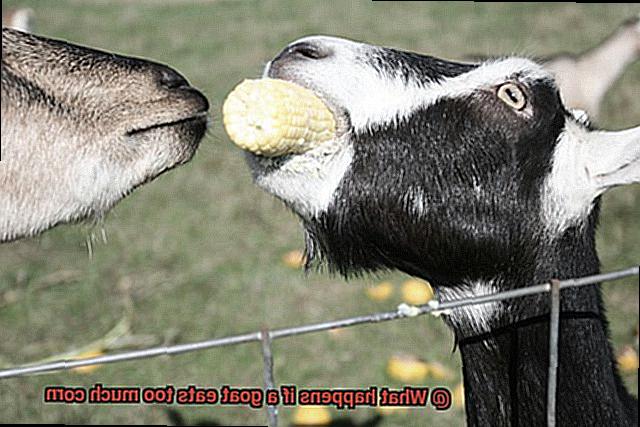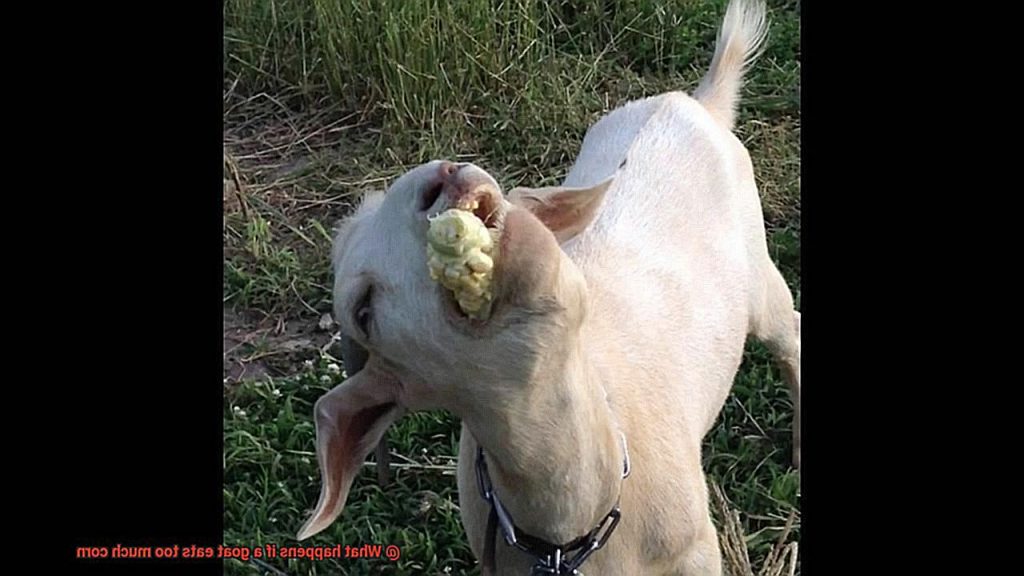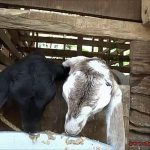Imagine this: you walk into your backyard and see your beloved goat chomping down on a massive pile of corn. Your first thought might be that your furry friend is enjoying a tasty treat, but did you know that too much corn can make them sick?
Corn is a popular feed option for goats because of its high energy and carbohydrate content. However, goats are herbivores, and their digestive systems aren’t designed to handle excessive amounts of corn. Overeating corn can lead to various health issues in your goat, from mild discomfort to severe illness.
One of the most significant risks of overfeeding corn to goats is rumen acidosis. This condition occurs when the pH levels in the rumen (one of the goat’s stomachs) drop too low. It can cause a shift in the rumen bacteria, leading to harmful toxin buildup like lactic acid. Symptoms include diarrhea, lethargy, and decreased appetite.
Apart from rumen acidosis, overeating corn can also lead to other health concerns such as obesity, bloat, and even urinary calculi. That’s why it’s crucial to monitor your goat’s corn intake carefully and provide them with a well-balanced diet that meets their nutritional needs.
So next time you catch your goat sneaking extra bites of corn, think twice before letting them indulge. Keeping their health in mind will ensure a long and happy life for your furry friend.
What is Corn and Why is it Popular for Goats?
Contents
If you’re a goat farmer, or planning to raise goats, you have probably heard about the popularity of corn as a feed option. But what exactly is corn, and why is it such a favorite among goat farmers?
Corn, also known as maize, is a widely used cereal grain that’s rich in carbohydrates, protein, and fiber. It’s well-liked by farmers because it’s affordable, easy to digest, and has a high energy content.

One of the main reasons why corn is so popular for goats is that it’s a highly digestible grain. Unlike other grains such as wheat and barley, corn has low levels of indigestible fiber, which can cause digestive issues for goats. Corn also contains high levels of starch, which provides goats with the energy they need to go about their daily activities and maintain their body condition.
Moreover, corn is readily available in many parts of the world, making it an accessible and convenient feed option for farmers. Additionally, it’s easy to store and transport, which makes it an ideal choice for those who need to stock up on feed for their goats.
However, it’s important to remember that feeding your goats solely on corn can lead to health problems such as obesity, digestive issues, and nutrient deficiencies. Therefore, it’s essential to provide your goats with a balanced diet that includes a variety of feeds such as hay, grasses, and other grains in addition to corn to ensure they get all the nutrients they need.
Feeding too much corn can result in serious health problems for your goats. One such issue is ruminal acidosis caused by overgrowth of lactic acid-producing bacteria in the rumen. This leads to diarrhea, dehydration, lethargy and a reduced appetite. Additionally, consuming too much corn can lead to bloat where gas accumulates in the rumen and cannot be expelled leading to swelling and discomfort. Moreover, corn lacks some essential amino acids, leading to a protein deficiency.
To prevent these health problems, it’s important to limit the amount of corn fed to goats and ensure they have access to plenty of fiber-rich hay or pasture. A balanced diet ensures that your goats get all the essential nutrients they need to stay healthy.
What is Ruminal Acidosis and What are its Symptoms?

As a goat farmer, you want to ensure your goats are healthy and happy. One important aspect of this is managing their diet. While corn is a popular grain that many farmers feed their goats, it’s crucial to understand the potential risks associated with feeding too much corn.
One of the most significant risks is ruminal acidosis, a digestive disorder that occurs when there is an imbalance in the pH levels in a goat’s rumen. The rumen is responsible for breaking down and fermenting food before it moves on to other chambers for further digestion. However, if a goat eats too much corn, it can cause rapid fermentation in the rumen, leading to an increase in lactic acid production. This increase in acidity can lower the pH levels and lead to ruminal acidosis.
So what are the symptoms of ruminal acidosis? Keep an eye out for decreased appetite, lethargy, diarrhea, dehydration, and bloating. In severe cases, lameness, difficulty breathing, and even death can occur. It’s important to note that not all goats that consume too much corn will develop ruminal acidosis, but it is a risk factor that should be taken seriously.
Preventing ruminal acidosis involves proper management of a goat’s diet. Corn should be introduced gradually and in small amounts, increasing over time as the goat’s digestive system adapts. A balanced diet with a variety of forages and grains can also help prevent imbalances in the rumen pH levels.
How Does Eating Too Much Corn Cause Bloat?
As a goat farmer, you want to give your goats the best possible diet to keep them healthy and happy. However, it’s crucial to understand that feeding them too much corn can result in a potentially life-threatening condition called bloat. This happens when there is a buildup of gas in the rumen, causing the stomach to expand and put pressure on the diaphragm, making it difficult for the goat to breathe.
But why does eating too much corn cause bloat? The answer lies in corn’s high carbohydrate content. When goats consume large quantities of corn, it ferments quickly in their rumen. This fermentation process produces gas, which accumulates in the rumen and causes bloating. If left untreated, the buildup of gas can also cause the rumen to become distended and push against other organs, leading to other complications.
In addition to bloat, excessive corn consumption can also cause acidosis in goats. Acidosis is a condition where there is an imbalance in pH levels due to too much acid in the rumen. This can occur when goats consume too many carbohydrates, such as corn, and their digestive system is unable to break down and absorb them properly.
To prevent bloat and acidosis in your goats, you must monitor their diet and ensure they are not consuming too much corn or other high-carbohydrate foods. Gradually introducing corn into their diet along with other forages and grains can help. Moreover, ensuring they have access to plenty of fresh water is essential.
If your goat does show signs of bloat or acidosis, it is crucial to seek veterinary attention immediately. Treatment may include medications to relieve gas buildup or changes in diet and management practices.
How Does Eating Too Much Corn Lead to Nutrient Deficiencies?
As a goat farmer, you care deeply about the health and happiness of your goats. However, did you know that feeding them too much corn can lead to nutrient deficiencies that could cause serious health problems? Let’s take a closer look at how eating too much corn can lead to nutrient deficiencies in goats.
Corn is high in carbohydrates but low in fiber, making it a poor food source for goats. When goats consume too much corn, the high carbohydrate content can cause acidosis, a potentially fatal condition that occurs when the pH level in the rumen drops too low. This can lead to dehydration, diarrhea, and even death.
What’s more, the low fiber content of corn means that goats are not receiving enough of the necessary nutrients they need to maintain good health. Corn contains very little protein, vitamins, and minerals, which are all essential for goat health. Over time, a diet high in corn can lead to malnutrition and other health issues.
One nutrient deficiency that can occur when goats eat too much corn is thiamine deficiency. Thiamine is a B-vitamin that is crucial for proper nerve and muscle function. When a goat’s diet lacks thiamine, they can develop polioencephalomalacia (PEM), a neurological disorder that can be fatal if left untreated.
To prevent these serious health problems from occurring, it’s critical to ensure that your goats receive a balanced diet that includes adequate amounts of fiber, protein, vitamins, and minerals. Monitoring their diet carefully and seeking veterinary attention immediately if they show any signs of distress is also important.
Prevention Strategies for Goats Eating Too Much Corn
As a goat farmer, you want to provide your goats with a well-rounded diet that includes corn. However, overfeeding corn can lead to serious health problems for your goats. So, how can you prevent your goats from overeating corn while maintaining a balanced diet? Here are some prevention strategies to keep in mind.
First and foremost, it is crucial to have a balanced diet plan in place that includes hay, pasture, and a limited amount of grain. Corn is high in starch content, which can cause digestive problems such as bloating, diarrhea, and acidosis. Therefore, it is recommended to feed no more than 25% of the total diet as grains, including corn.
Another helpful strategy is to feed your goats small amounts of corn several times a day instead of one large meal. This will help regulate their digestion and reduce the risk of overeating. Plus, it’s always exciting for goats to have multiple meals throughout the day.
In addition to these strategies, providing ample fresh water and salt blocks can also help prevent goats from consuming too much corn. Water helps with digestion and keeps the digestive system moving smoothly. Salt blocks provide essential minerals that goats need and can also help regulate their appetite.
Lastly, monitoring your goats’ behavior and health regularly is crucial for preventing overeating. Keep an eye out for any discomfort or signs of digestive issues such as bloating or diarrhea. If you notice anything concerning, it may be time to adjust their diet or seek veterinary care.
When to Seek Veterinary Care for Goats Eating Too Much Corn
As a devoted goat farmer, you want to make sure your goats have a balanced diet that includes hay, pasture, and limited grain intake. However, even with your best efforts, goats can still overindulge in corn, which can lead to severe health problems that require immediate veterinary care.
Overconsumption of corn can cause a variety of health issues for goats, including bloating and acidosis. Bloating occurs when the high carbohydrate content in corn leads to gas buildup in the goat’s stomach. This can result in discomfort and even death if not addressed promptly. On the other hand, acidosis is a condition that arises from the rapid fermentation of corn in the goat’s digestive system. This condition can lead to diarrhea, dehydration, and a decrease in appetite.
If you notice any of these symptoms in your goat after they have eaten too much corn, contact your veterinarian immediately. Your veterinarian will assess the situation’s severity and provide appropriate treatment, which may include administering medication or fluids to alleviate the symptoms.
Preventing overconsumption of corn is the best approach. You can gradually introduce corn into their diet while monitoring their intake. Providing plenty of roughage and fresh water can also help prevent digestive issues.
vVfOddq87C4″ >
Conclusion
In conclusion, it’s crucial to be mindful of your goat’s corn intake as overindulging can lead to a range of health issues, from mild discomfort to life-threatening illnesses. While corn is a popular feed option for its high energy and carbohydrate content, goats are herbivores with delicate digestive systems that aren’t designed to handle excessive amounts of corn.
Overeating corn can cause rumen acidosis, obesity, bloat, urinary calculi, nutrient deficiencies, and even death. To prevent these issues from occurring, it’s essential to monitor your goat’s diet carefully and provide them with a well-balanced meal plan that meets their nutritional needs.
Gradually introducing corn into their diet alongside other forages and grains can help regulate their digestion while ensuring they receive all the necessary nutrients. Additionally, monitoring your goats’ behavior and health regularly is crucial for preventing overeating.
Be vigilant for signs of discomfort or digestive issues such as bloating or diarrhea. If you notice anything concerning, it may be time to adjust their diet or seek veterinary care.






